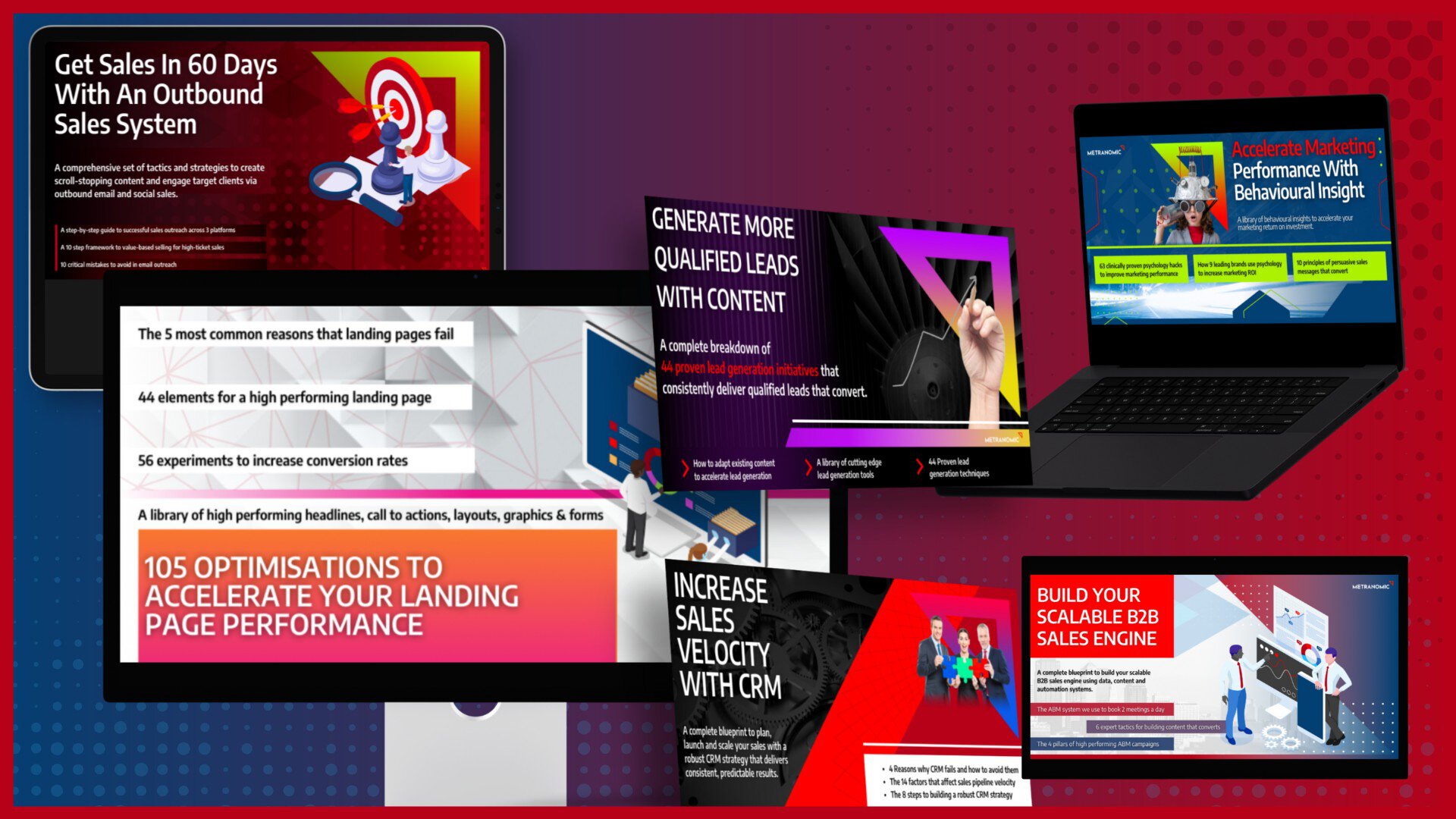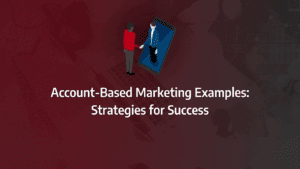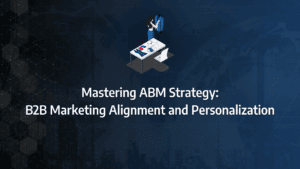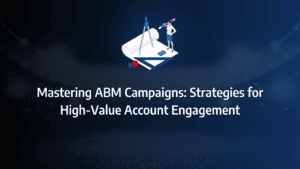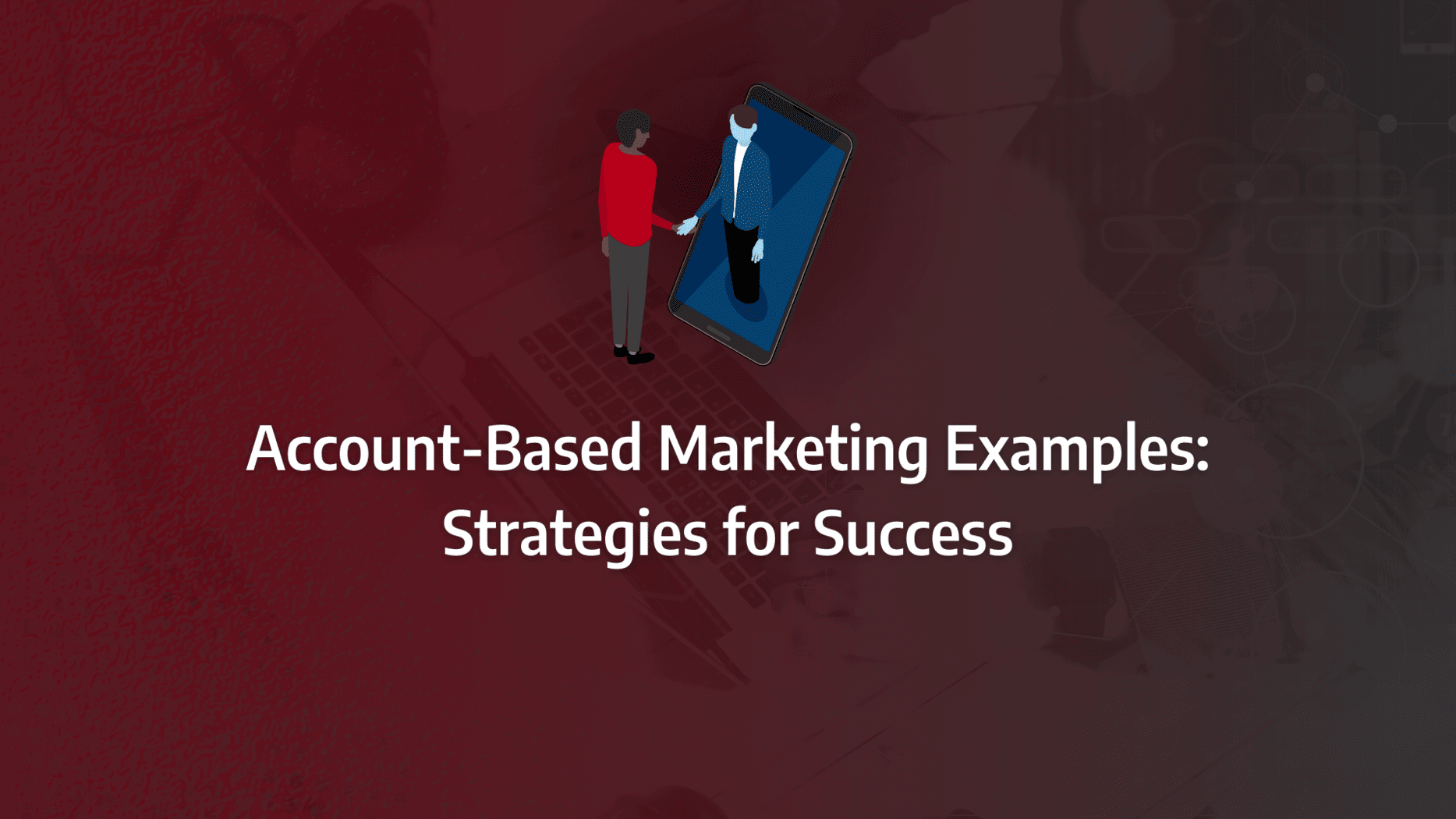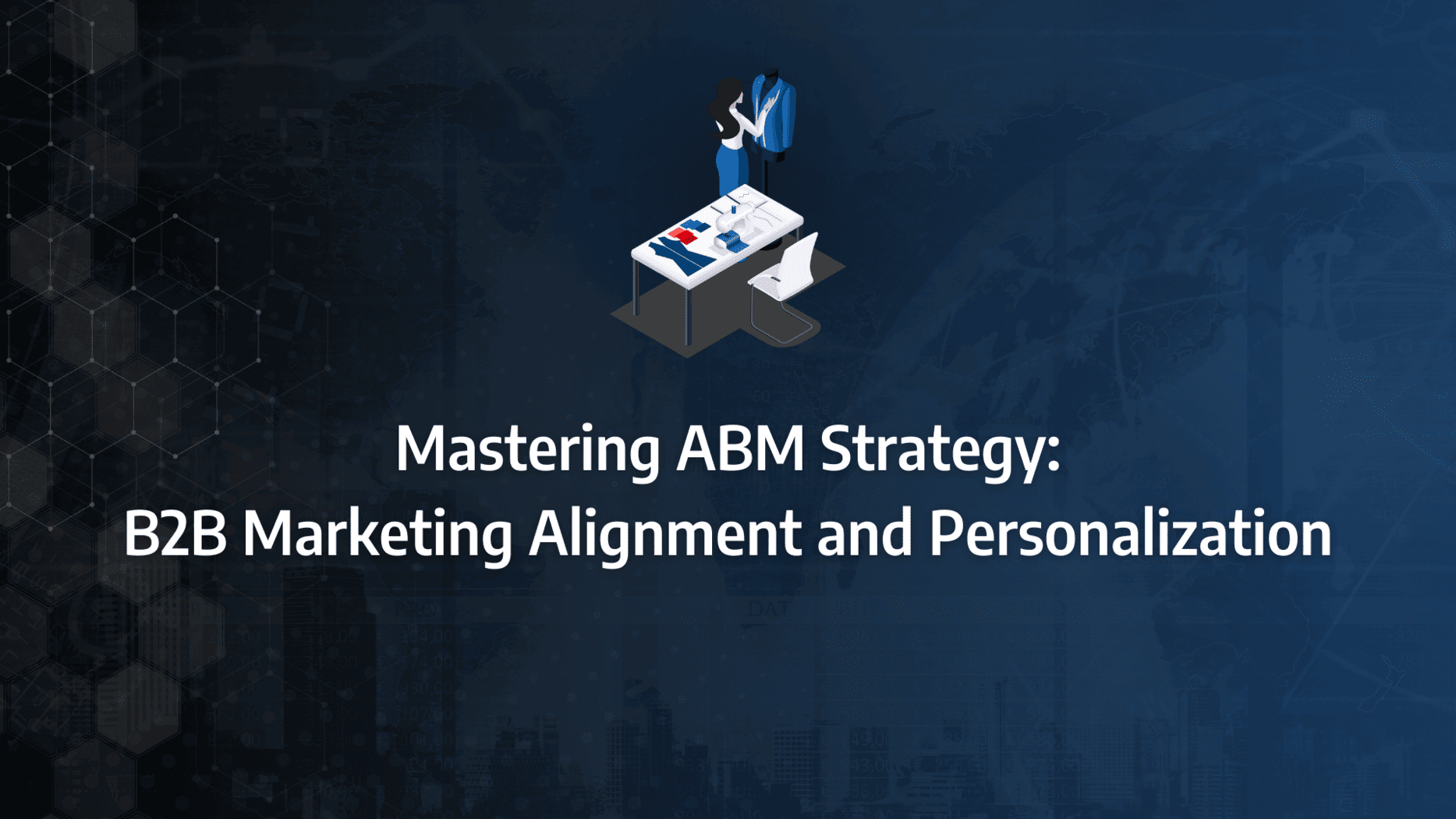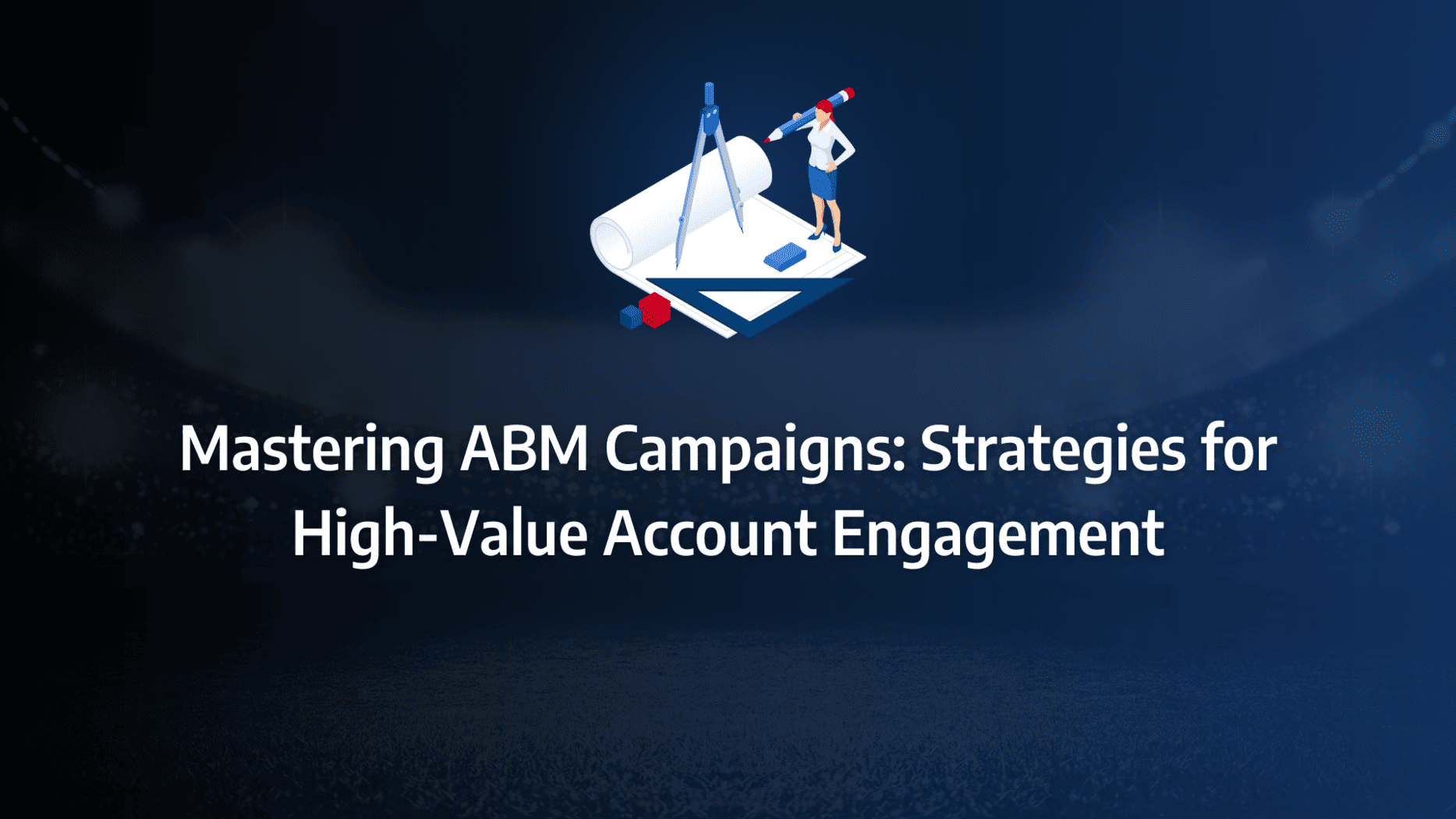It’s easy to feel overwhelmed by the constant pressure to deliver results. You’ve tried various tactics, but the return on investment just isn’t there, and your sales and marketing teams seem to be speaking different languages. Sound familiar? You’re not alone. Many businesses face the same struggle, and that’s where Account-Based Marketing (ABM) comes into play.
ABM offers a powerful, targeted approach that not only aligns your teams but also ensures that every marketing effort is focused on high-value accounts most likely to convert. Imagine a strategy that not only boosts your ROI but also strengthens customer relationships and drives long-term growth. Ready to transform your marketing efforts? Let’s dive into the benefits of ABM and how it can elevate your strategy to new heights.
- Account-Based Marketing (ABM) focuses your marketing efforts on high-value accounts, increasing the likelihood of conversions and improving overall ROI.
- ABM fosters better alignment between sales and marketing teams, ensuring cohesive strategies and shared goals.
- Personalised marketing tactics within ABM lead to higher engagement and stronger customer relationships.
- Implementing ABM can enhance customer retention and expansion by deepening trust and satisfaction.
- Utilising data and technology in ABM helps identify and target the most promising accounts, streamlining your marketing efforts.
What considerations should influence my decision to adopt ABM strategies?
How Account-Based Marketing Systems Deliver Value for Businesses
When your marketing and sales teams collaborate, ABM capabilities can deliver an exceptional buying experience through research-driven content. This collaboration allows businesses to significantly boost ROI by effectively engaging the target audience and specific prospects.
In B2B marketing, focusing on a single buyer is ineffective. The purchasing process involves multiple decision-makers and departments. ABM focuses on creating the optimal buying experience to maximise the number of business opportunities.
Another notable advantage of ABM is the ability to repurpose content, enhancing the value of all produced materials. By integrating these ABM tactics with inbound marketing strategies, you will significantly improve your chances of capturing the attention of potential prospects.
What Matters Most?
Leveraging account-based marketing to enhance collaboration between marketing and sales teams can significantly drive revenue growth. Clients often discover that this synergy is a key benefit of ABM that tends to be overlooked. Additionally, when messaging is personalised for key accounts, it fosters deeper customer relationships—something many organisations fail to fully appreciate. It’s also crucial to track the measurable impact of ABM on ROI; neglecting this aspect may mean missing valuable insights into how focused strategies yield higher returns.Get In Touch
Building and Nurturing Customer Relationships
Account-Based Marketing is all about fostering relationships with the right stakeholders at the opportune time. Rather than spreading your efforts across a broad audience, ABM allows you to focus exclusively on the most relevant, sales-ready accounts.
Once these key accounts and their stakeholders are identified, you can nurture them with personalised content and messaging that addresses their specific needs and concerns. This approach significantly enhances the customer experience and lays a solid foundation for future business opportunities.
Enhanced Customer Acquisition Process
ABM represents a modern twist on an age-old marketing practice: personalisation and nurturing of key prospects and customers. By allowing marketing teams to eliminate unproductive leads that frustrate sales teams, ABM puts a spotlight on the customer acquisition process, ultimately strengthening the marketing team.
Cost Efficiency
Targeting specific accounts your business has identified as prospects can be highly cost-efficient. This efficiency is amplified when utilising advanced tools on social platforms that enable precise targeting of companies or organisations. For businesses that have a clear understanding of their most valuable targets, the advantages of ABM from a budgetary perspective are significant.
Enhanced Insights with ABM
ABM’s focused approach equips sales teams with precise, actionable insights. By concentrating on pre-selected accounts, ABM provides rich, relevant data that fosters a deeper understanding of each prospect’s unique needs and behaviours. This intelligence empowers sales teams to develop more informed and effective sales strategies. Instead of a broad approach, ABM offers a tailored view of each account, enabling sales teams to craft precise tactics that increase conversion likelihood.
Accelerated Sales Process
ABM can significantly accelerate the B2B sales process by engaging all key decision-makers within the target account from the outset, thereby reducing the time to close a deal. An Aberdeen Group study found that companies implementing ABM programmes experienced a 30% reduction in their sales cycle length. This not only shortens sales cycles but also enhances the efficiency of sales teams, leading to more sales wins within a given timeframe. By streamlining the sales process, ABM plays a crucial role in driving faster and more efficient revenue generation.
Efficient Use of Resources
Traditional broad-based marketing campaigns often stretch resources thin, leading to one-size-fits-all messaging that can result in lower-quality leads and divert sales teams from higher-value prospects. One of the key ABM benefits is the alignment between sales and marketing, making it a collaborative effort to drive higher-quality engagements. Teams working on ABM campaigns collaborate to identify target accounts and tailor the nurturing process to meet the specific needs of these businesses.
Automated Processes
As technology advances, marketing automation tools with account-based tracking capabilities become invaluable in executing ABM strategies. These tools can automate tasks such as email notifications and responses based on account activity and engagement. Furthermore, using account information can enable the display of personalised content to users based on known properties or segments within target accounts. Dynamic landing pages and calls to action can also drive greater engagement. The marketing technology stack thus becomes a powerful ally in executing effective ABM strategies.
Source: WebFX
How does integrating ABM with existing systems enhance results?
Account-Based Marketing serves numerous functions within a business. Here are five key ABM benefits demonstrating the practical applications of ABM strategies:
Enhance Team Alignment
A multichannel approach to ABM marketing enables sales and customer service teams to collaborate seamlessly, leading to a more streamlined and effective sales process. This alignment is one of the critical advantages of ABM, ensuring all team members work towards common goals.
Seamless Integration
Integrating ABM solutions with existing automation and Customer Relationship Management (CRM) tools ensures that campaigns run smoothly across all platforms. This integration enhances ABM capabilities, providing a cohesive approach to managing and executing marketing strategies.
Execute Multichannel Campaigns
One of the significant benefits of ABM is its focus on reaching the ideal customer through their preferred channels, whether it be social media, mobile, videos, blogs, or email. By employing A/B testing, businesses can identify which channels most effectively convey their messages, enhancing their overall marketing strategy.
Utilise Account-Based Technologies
Engaging ideal customers through digital channels is another ABM benefit that is easy to scale. This engagement often involves the entire account, making it more likely to secure sales. The precision of ABM capabilities allows for targeted and efficient marketing efforts.
Target Specific Audiences
Digital targeting is a powerful tool within ABM, allowing businesses to locate and specifically target the best-fit companies, accounts, and ideal customers. With the help of advanced ABM software, business leaders can refine their marketing across campaigns, buyer personas, and every stage of the sales process. This highly personalised approach to marketing ensures that messages resonate with the audience and align with the brand’s image.
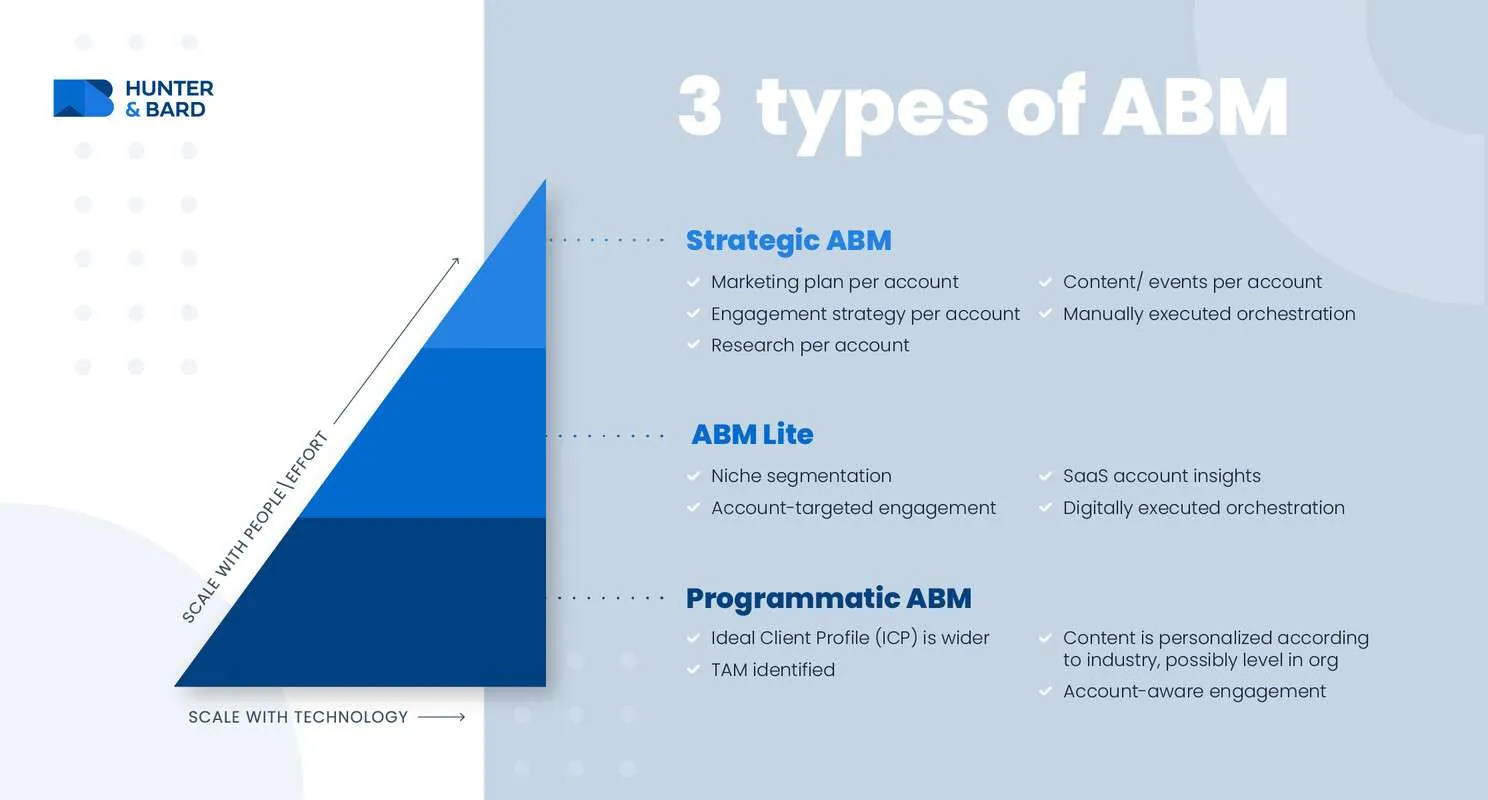
What essential steps should I take to implement an ABM strategy?
Planning, implementing, and optimising your Account-Based Marketing programme can be streamlined with this straightforward step-by-step breakdown:
Step 1: Identify and Define Your Target Accounts
Begin by collecting and analysing firmographic data and business insights to pinpoint your target accounts. Prioritise accounts that offer the most value by considering factors such as:
- Market influence
- Deal potential
- Repeat purchase likelihood
- The potential profit your business could realise from each account
Step 2: Map Your Accounts
Understand how your targeted accounts operate. Identify key decision-makers and the influencers impacting their decisions. This insight is crucial for developing effective ABM strategies.
Step 3: Plan and Personalise Content and Messages
Craft content and messages tailored specifically for each targeted account. Ensure the information provided demonstrates clear value and addresses the unique pain points and business challenges of these accounts. This personalisation is a core component of the benefits of ABM.
Source: LinkedIn
Step 4: Choose the Right Communication Channels
Engage with your target accounts through their preferred communication channels, such as email, mobile, or web. Take into account the specific industries you are targeting and any relevant rules and restrictions. This strategic approach enhances your ABM capabilities.
Step 5: Coordinate Campaigns
Utilise technology to align the efforts of your sales and marketing teams. This coordination is essential for executing high-quality and impactful ABM campaigns. Effective teamwork maximises the advantages of ABM.
Step 6: Test, Analyse, and Optimise
Continuous optimisation of your ABM campaigns is critical. Conduct regular tests and analyse the results of both individual account campaigns and overall account-level strategies. This analysis provides an accurate assessment of campaign effectiveness, allowing you to refine your marketing and sales approaches accordingly.
Our Tactical Recommendations
Engaging decision-makers directly is an effective way to shorten sales cycles. Additionally, high-value accounts can be identified using data analytics, allowing for optimised resource allocation—a valuable opportunity frequently overlooked by many firms. Prioritising a customer-centric approach should be a top focus; clients frequently find that this emphasis leads to improved engagement and outcomes, which are often missed in traditional marketing practices.Get In Touch
How can I determine if ABM is right for my business needs?
Many businesses are attracted to Account-Based Marketing (ABM) due to its numerous benefits. However, it is essential to recognise that each company is unique. So, how can you determine if ABM is suitable for your business? Consider the following nine scenarios where businesses reap significant ABM benefits:
- Your Business Targets B2B Accounts: ABM is ideal for businesses exclusively targeting B2B clients. If your focus includes B2C clients, ABM may not be as beneficial.
- Your Business Has a Sales Team: A well-organised sales team is vital for any ABM strategy. For the best results, ensure your business has a dedicated sales team to implement ABM effectively.
- Focus on a Select Group of Clients: ABM is particularly beneficial for businesses that need to concentrate on specific clients, such as Fortune 500 companies. This focus maximises the benefits of ABM by tailoring efforts to high-value targets.
- Your Business Can Afford the ABM Budget: ABM platforms can cost approximately £800 per month, excluding additional necessary tools. Carefully evaluate all costs to ensure ABM fits within your budget.
- A Desire to Experiment with Your Marketing Approach: If your current sales and marketing strategies are not yielding desired results, ABM offers a fresh approach that can revitalise your efforts and outcomes.
- Strong Reputation and Brand Image: Businesses with low brand awareness may struggle with ABM strategies. A strong reputation is crucial to gain the most advantages of ABM and attract high-value clients.
- Your Clients Have a High Contract Value: ABM is highly effective for businesses aiming to appeal to clients with high contract values, allowing for more personalised and impactful marketing.
- Need for Long-Term Client Relationships: The personalised nature of ABM makes it particularly beneficial for businesses that require long-term relationships with their clients, fostering deeper connections over time.
- Your Competition is Already Benefiting from ABM: If your competitors are successfully using ABM strategies, it indicates that you might also benefit from adopting ABM capabilities.


